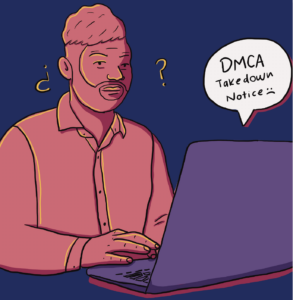Access Denied: New White Paper on How US Copyright Policy Negatively Impacts Free Expression Worldwide
Citizen Media Law Project 2020-12-04
The Cyberlaw Clinic was proud to partner with Article 19 Mexico and Central America to author a new white  paper, Access Denied: How Journalists and Civil Society Can Respond to Content Takedown Notices (DMCA-digital-english_FINAL) / Acceso Denegado: ¿Cómo pueden responder los y las periodistas y la sociedad civil a las notificaciones de eliminación de contenidos? (DMCA esp-digital_FINAL). The report highlights a growing phenomenon, in Latin America and around the globe, in which US copyright law–in particular, Section 512 of the Digital Millennium Copyright Act, known as the “notice and takedown” provision–is used to target and censor journalists’ legitimate free expression.
paper, Access Denied: How Journalists and Civil Society Can Respond to Content Takedown Notices (DMCA-digital-english_FINAL) / Acceso Denegado: ¿Cómo pueden responder los y las periodistas y la sociedad civil a las notificaciones de eliminación de contenidos? (DMCA esp-digital_FINAL). The report highlights a growing phenomenon, in Latin America and around the globe, in which US copyright law–in particular, Section 512 of the Digital Millennium Copyright Act, known as the “notice and takedown” provision–is used to target and censor journalists’ legitimate free expression.
Drawing on case studies from journalists’ experiences in Mexico, Brazil, Venezuela, and Colombia, Access Denied/Acceso Denegado illustrates how the DMCA takedown procedure is fraudulently invoked by individuals and organizations seeking to suppress journalism to which they object. Posing as copyright holders, they submit takedown notices to the US-based web hosts of the Latin American news organization. The web hosts’ processes for handling takedowns, designed to mitigate their own risk, rarely if ever allow for the fraud to come to light, and all too frequently, the takedowns become permanent.
The white paper goes beyond documentation of the problem to offer advice to journalists and others in civil society who may find themselves the victim of these attacks, including offering an overview of the applicable law as well as practical strategies to help increase the odds that valuable content can remain online and accessible.
Article 19 and the Cyberlaw Clinic are deeply grateful for the research provided by Espacio Publico, Fondacion Karisma, Indela without whom the report could not have been written. Initiative for a Representative First Amendment intern Jafet Martinez-Molina and Spring 2020 Cyberlaw Clinic student Daniel Oyolu both worked on the project under the supervision of Assistant Director Jessica Fjeld.